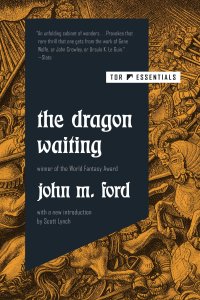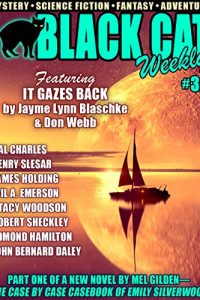Paul Di Filippo Reviews The Dragon Waiting by John M. Ford
 The Dragon Waiting, John M. Ford (Tor 978-1250269010, $15.99, 400pp, trade paperback) September 2020.
The Dragon Waiting, John M. Ford (Tor 978-1250269010, $15.99, 400pp, trade paperback) September 2020.
For years after the death of John M. Ford in 2006, fans believed as doctrinal truth the assertion that, in the wake of his having died without formal plans for the continuance of his estate, his mean-spirited surviving family members, who all hated his career and even the existence of science fiction, were conspiring to keep his works out of print, and render his legacy nonexistent. The actuality of the situation proved considerably more complicated, however, as revealed in an essay from 2019 by Isaac Butler, “The Disappearance of John M. Ford”. The whole experience should be a salutary and educational one for all of us, about being cautious concerning unsubstantiated myths and misinformation. But having now gotten over our chagrin at our gullibility, we reap the benefits of Butler’s campaign of revelations, as the works of Ford gradually return to print (including two volumes of previously unpublished stuff!). First up is what might arguably be termed Ford’s masterpiece, The Dragon Waiting, winner of a World Fantasy Award, yet which has not had an edition in this country since 1988.
It’s hard to know where to begin discussing this book, which, viewed at the most reductionist level, is “merely” a brilliantly extrapolated counterfactual history that links arms with Keith Roberts’s Pavane. The scenario, briefly: Roman Emperor Julian the Apostate reigned for a longer period than he did in our world and managed to render Christianity an almost non-existent artifact, and make unfettered multi-religion freedom of worship the law of his Empire. Islam likewise disappeared, and thus, in the 15th century, Byzantium still flourishes, controlling most of Europe.
We encounter this information slyly and elegantly delivered in bits and pieces, and Ford utilizes three viewpoints to get us entered into his world.
First we meet Hywel, a young boy living in the hinterlands of Wales. Naïve but bright, he encounters an imprisoned wizard (for real magic also exists in Ford’s continuum) and learns that he himself, Hywel, has magical potential. He and the wizard run away, with Hywel just beginning his apprenticeship.
We next cut to the second-rank city of Alesia in Gaul. There lives the Ducas family, with teenage son Dimitrios, or Dimi. Potentially heirs to the throne in Byzantium, the Ducas clan have been relegated to this frontier to diminish their status (shades of the Atreides family in Dune!). We witness Dimi as he experiences several milestones in his voyage of maturity before he too encounters the upheaval of his life and a brand of exile.
Thirdly we are in Florence, in the household of Lorenzo Medici, where a young woman doctor named Cynthia Ricci ministers to the sickly ruler. In this chapter we get our most vivid introduction yet to another factor of Ford’s timeline, the existence of real vampires—for the Duke of Sforza, rival to the Medicis, is one such. As you might have guessed by now, Cynthia’s formerly stable and assured lifestyle is overturned as well, and she hits the road.
Chapter 4 unites our three protagonists—with Hywel and Dimi now fully mature and accomplished adults, but Cynthia just slightly advanced in her overlapping timeline—at a country inn where they bond with a fourth person, Gregory von Bayern, a restrained and peaceful vampire. In a very clever move, this long chapter functions as a kind of self-contained yet more largely relevant murder mystery, the solving of which reinforces the cohesion of the group. From here, the quartet set out on a series of Machiavellian, espionage, thriller-type adventures that culminate in their helping Richard III take the throne against a variety of adversaries. And with this climax, they all disperse. The end.
Several things need to be said immediately.
First to mind is the clever structure of the first three chapters, as they feed into the fourth one. We start as far away from Byzantium as possible, remote Wales, with the most ignorant and untutored of our cast. Then in chapter two, our hero is a bit older and a bit more cosmopolitan. Finally, in chapter three, we switch genders and also encounter the wisest and most erudite of the trio. The chronological disjuncture in chapter four—Hywel and Dimi are suddenly adults—and the introduction of the last member of the quartet in a less-intimate biographical fashion provides a pleasant shock. One senses a nod to The Three Musketeers in this setup.
It should also be noted that despite being the engine of all the politics, Byzantium, ironically, is never encountered up close in these pages. All the action is at the periphery of the empire. Is this a reader-cheater maneuver, or just a manifestation of Ford’s literary contrariness? I side with the latter interpretation and feel that once we get used to the idea that we will never walk the actual streets of Byzantium, what remains is more than enough to hypnotize us. Ford adduces a thousand details, large and small, to convince us of the logic and inevitability of his alternate history.
Any city the size of London must contain every sort of person and belief, and at the end of the year they all found something to celebrate: the lengthening of the day after the Solstice, the longest night itself (and the lost things found upon it), the birth of Mithras, Saturnal, year-change in all its social and numerological and astrological implications, the twelvemonth of city refuge that made serf or villein into townsman, transforming his life of rural toil into one of urban poverty.
And on this December day, everyone in London seemed to have taken their celebrations into the street, which was colorful and noisy and surpassing merry but made a traveler’s progress just about impossible.
Hywel and Dimitrios, Cynthia and Gregory turned left and right and sometimes right around, blocked at all turns by processional dancers, bear-baiters, staff-swingers looking for a keg or a skull to crack open, minnesingers weeping into their lutes. The gutters ran with mint water and foxed beer, a little blood when the Little Johns collided, and the more usual savories. There were green-sashed Gawaines and horned Hernes, Kyrils with crown and quill, and choristers singing recitatives to anybody listening. Milk Street ran white: the Worshipful Company of the Art and Mystery of Dentistry was turned out in mass to cheer the passage of the Sun into Capricorn, auspicious for the pulling of teeth.
The quartet of adventurers conforms almost parodically to an archetypical D&D expedition: wizard, warrior, healer, monster/nonhuman/supernatural being. This has to be strictly intentional on Ford’s part, a desire to prove that cliches can be glorified in the right hands. And indeed, so deep are their characterizations and interactions that I for one never thought of these obvious labels until after closing the book. Likewise, all the ancillary characters, both “historical” and invented, possess the kind of Shakespearean tangibility that makes them leap off the page. Surely Poul Anderson’s A Midsummer Tempest must have been on Ford’s mind as a model.
The leisurely, convoluted plotting of the book, with its many moments of politesse-infused maneuvering, conjures up links with Eddison’s A Fish Dinner in Memison, while the classically haunted groves and byways of this altered Europe made me think of Thomas Burnett Swann’s pastoral, dryad-inhabited novels. A major cliffhanger moment—one of our quartet gets shot, and we do not learn of the character’s fate till many pages later—shows Ford’s desire and ability to keep us on the edge of our seats and guessing.
As an examination of the urge to power, Ford’s book is one of the less wistful fantasies, and readers might regard Seth Dickinson’s Baru Cormorant trilogy as a descendant.
With sharp-edged prose and crystal-clear action scenes, at once magisterial yet mundane (in the sense of honoring the daily intimacies of living), Ford’s novel constructs a world equal to our own that we wish to inhabit for many volumes. That he dropped such a confection in our laps, then walked away from it without a backward or continued look is frustrating, to be sure—but arguably a mark of the unique kind of artist that John M. Ford was.
 While you are here, please take a moment to support Locus with a one-time or recurring donation. We rely on reader donations to keep the magazine and site going, and would like to keep the site paywall free, but WE NEED YOUR FINANCIAL SUPPORT to continue quality coverage of the science fiction and fantasy field.
While you are here, please take a moment to support Locus with a one-time or recurring donation. We rely on reader donations to keep the magazine and site going, and would like to keep the site paywall free, but WE NEED YOUR FINANCIAL SUPPORT to continue quality coverage of the science fiction and fantasy field.
©Locus Magazine. Copyrighted material may not be republished without permission of LSFF.







I’m not sure we read the same article in Slate – I thought it was quite clear from Mr. Butler’s article that Mr. Ford’s family were right bastards after his death to basically everyone that knew him, not least his life partner whom they refused to recognize. Perhaps they were not “conspiring” to keep his works out of print, but their actions and despicable behavior led directly to that consequence. I think it was very politic of Mr. Butler to act as an apologist for their actions and highlight some of the poor luck and coincidence that led to his work being out of print so long, but reading between the lines it seems to me his family do bear the majority of the responsibility for that.
Great review of the book though! It absolutely deserves a much larger audience, although I’m not sure Tor’s bare bones paperback production is going to win it. I’m about halfway through a re-read and have found multiple spelling and grammatical mistakes, and the print quality is not great. I would love to see a small press publisher like Centipede Press or Suntup get the rights to make a high quality illustrated hardcover of The Dragon Waiting and some of Ford’s other work.
Also, fantastic point about the D&D/role play connection – I had not thought of it when reading the book either, but it makes perfect sense as Ford was a regular player of role playing games and wrote many volumes for games like GURPS, Paranoia, Traveller and Star Trek.